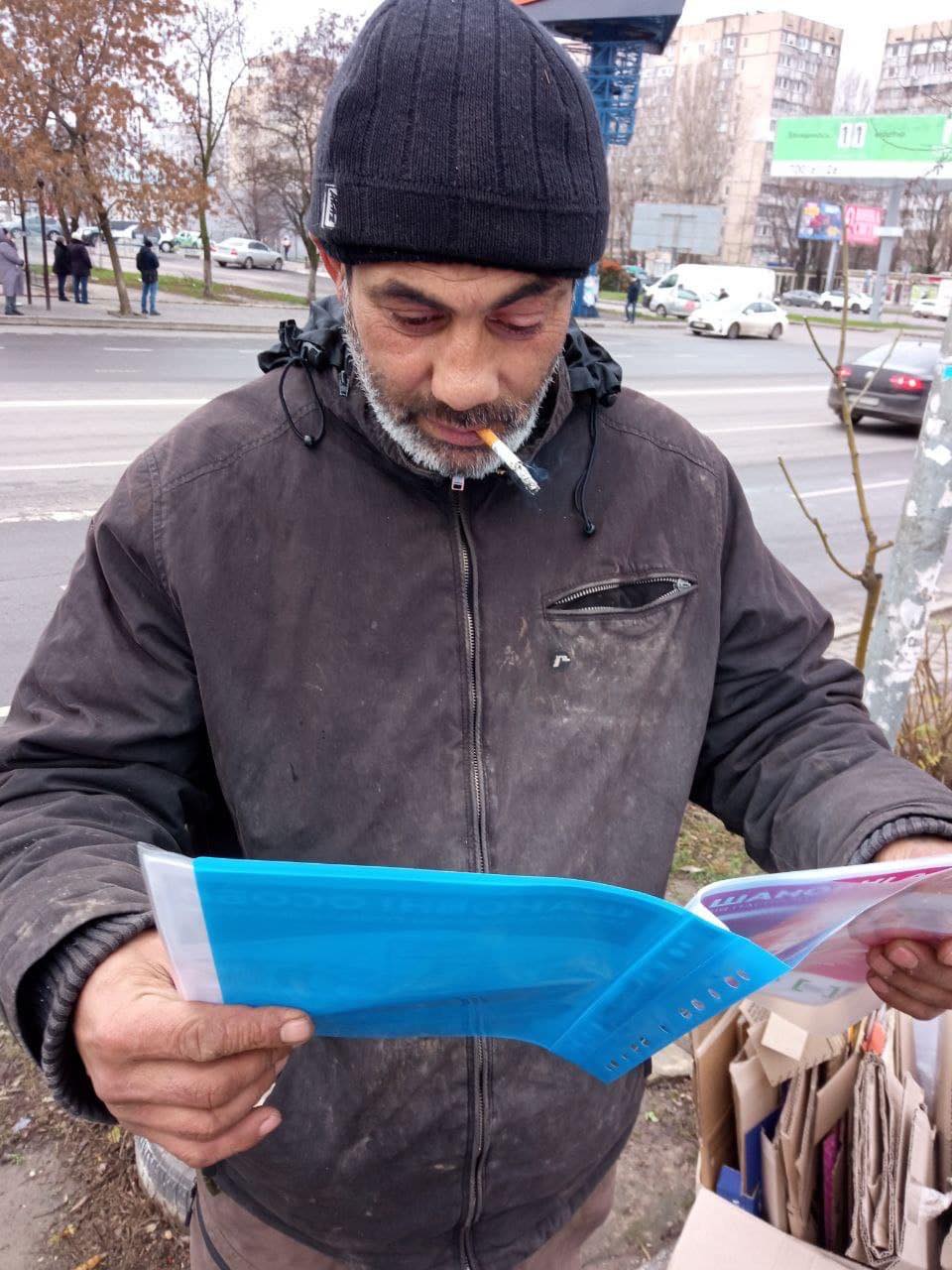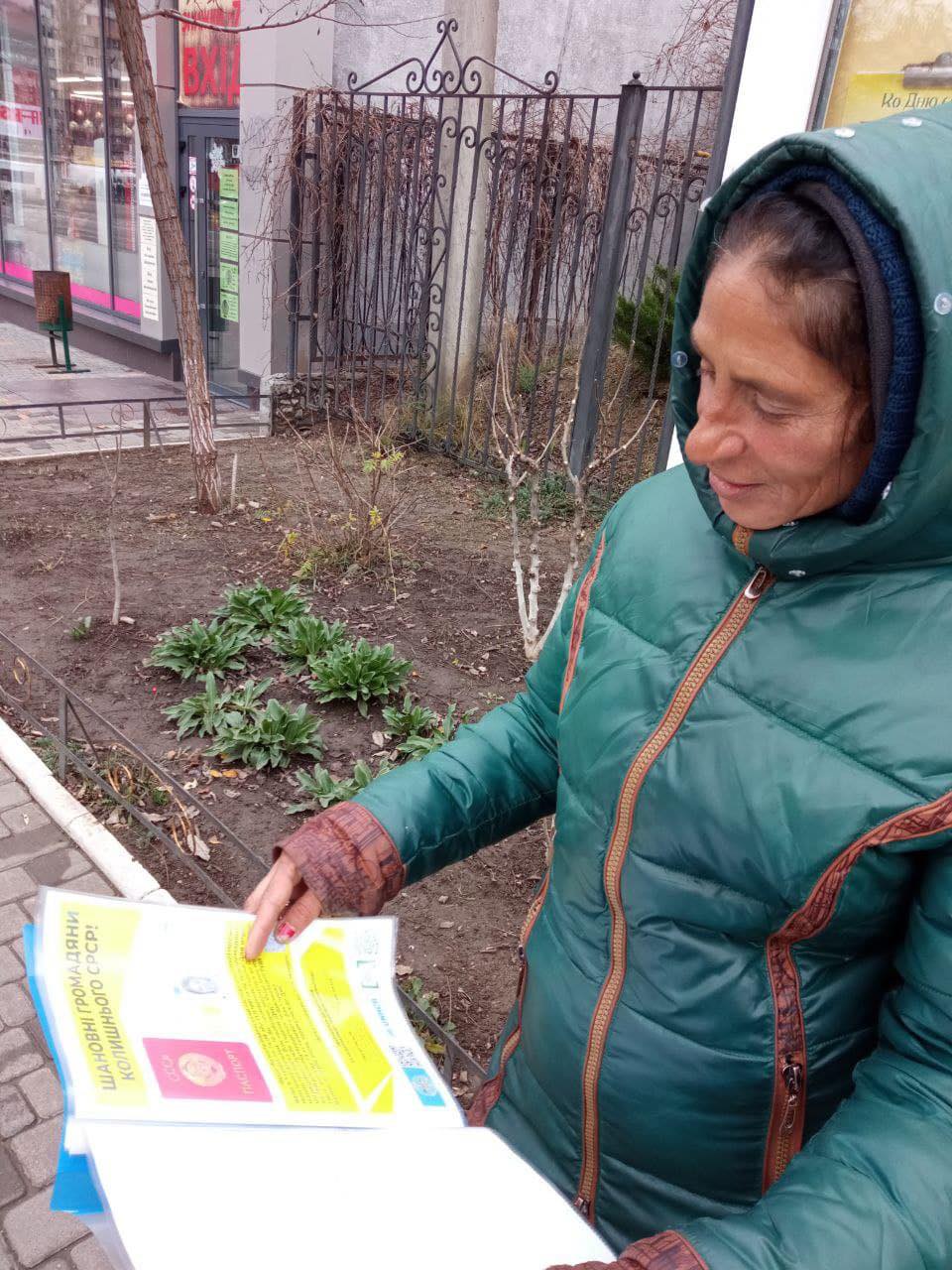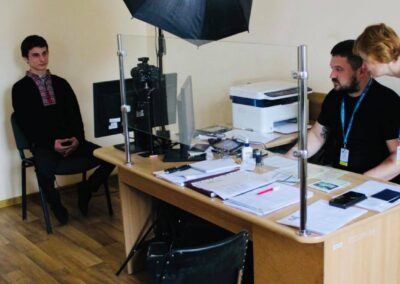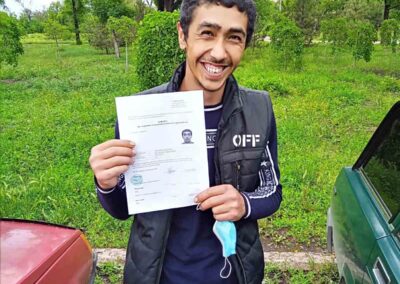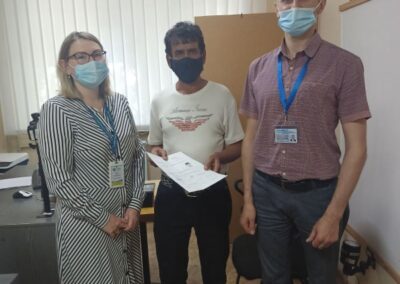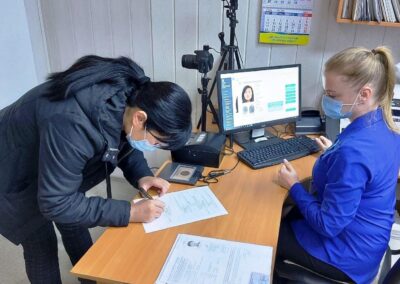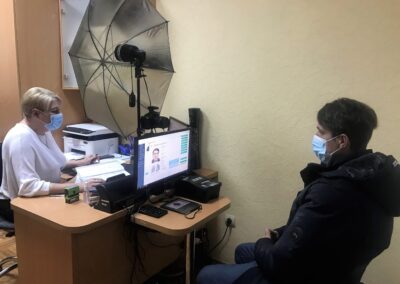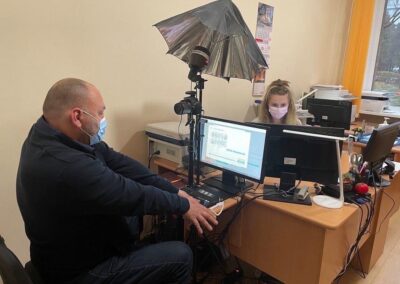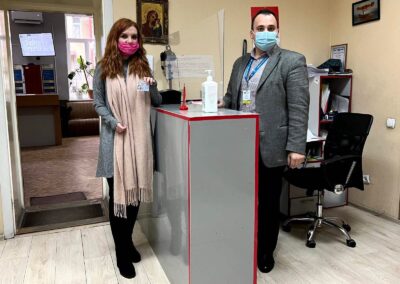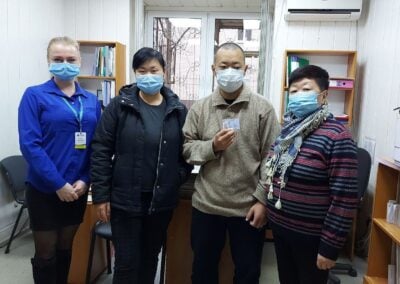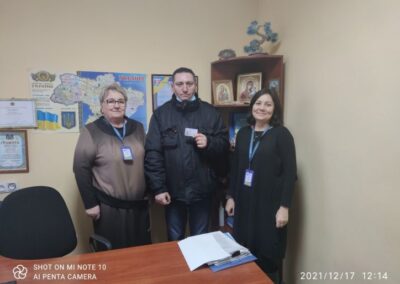The international legal definition of a stateless person is “a person who is not considered as a national by any State under the operation of its law”. In simple terms, this means that a stateless person does not have the nationality of any country. Some people are born stateless, but others become stateless later in life.
Stateless people are found in all regions of the world. The majority of stateless people were born in the countries in which they have lived their entire lives. Today millions of people around the world are denied a nationality. As a result, they often aren’t allowed to go to school, see a doctor, get a job, open a bank account, buy a house or even get married.
The exact number of stateless people is not known, but UNHCR estimates that there are many millions globally – of which approximately one third are children.
The photo shows the mural “Little Citizen”, which was opened by UNHCR in Kyiv as part of the celebration of the 5th anniversary of the global campaign to eradicate statelessness.
The mural can be found at: 11, Yaroslavskaya Str.
UNHCR assistance to stateless and persons with undetermined nationality
From the 1990’s until 2013, UNHCR has had a historic role and has worked extensively on identification, prevention and reduction of statelessness in Ukraine. UNHCR through Foundation “Assistance” supported Formerly Deported Persons (FDPs) and their descendants returning to Ukraine in the process of relinquishing their previous citizenship and acquiring Ukrainian nationality. Those assisted were mainly ethnic Crimean Tatars returning to the Autonomous Republic of Crimea from forced exile in Central Asia (mostly Uzbekistan).
The 1997 amendments to the Citizenship Law led to acquiring of Ukrainian nationality by some 25,000 stateless FDPs as of 2001. In addition, Uzbekistan and Ukraine concluded an agreement backed by both UNHCR and the OSCE High Commissioner on National Minorities facilitating acquiring of Ukrainian nationality of a further 90,000 FDPs during 1999-2001.
In 2001, following intensive advocacy by UNHCR and the Council of Europe, a new Citizenship Law of Ukraine introduced a simplified procedure for acquiring Ukrainian nationality as a result of which applicants no longer had to renounce their previous nationality (becoming stateless in the process) before applying for Ukrainian citizenship. The previous requirements for Ukrainian language proficiency and five years of lawful residence were also waived for persons with links to Ukraine, including FDPs.
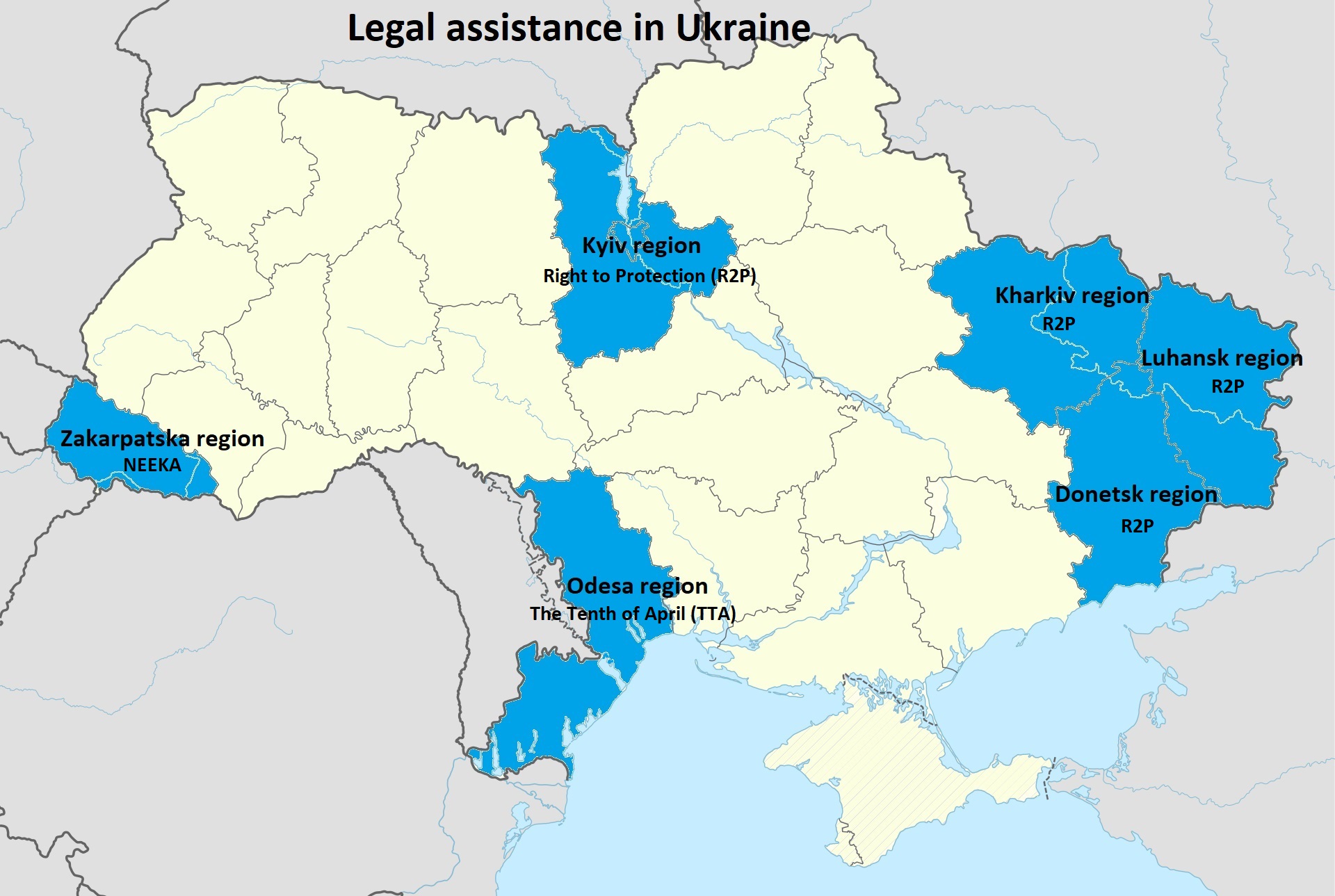
From June 2017 to June 2021 (49 months), UNHCR partners: “NEEKA”, “Right to Protection”, “Tenth of April” identified and provided legal aid/representation at court, Civil Registry, SMS and CIS countries consulates in Donetsk, Kyiv, Luhansk, Odesa, Kharkiv and Zakarpatska oblasts to 3,092 undocumented persons. Among them:
- 2,355 persons with undetermined nationality (45% of them are Roma). As a result, 1,222 documents were obtained: 193 birth certificates on the basis of court decision establishing a fact of birth (during the year); 508 duplicates of birth certificates (including 69 foreign which were received in the period ranging from 1 month to 1,5 years) on the basis of application to Civil Registry; 521 passports (including 80 passports of foreign countries and 441 Ukrainian passports) on the basis of identity setting procedure/establishing belonging to citizenship at SMS (during 2 months)/ CIS countries consulates (from 2 to 12 months).
- 427 persons with undetermined nationality who are citizens of the former USSR, who (permanently) resided on the territory of Ukraine as of August 24 / November 13, 1991 and did not obtain the inscription “citizen of Ukraine” in their passport from the Ministry of Internal Affairs. The partners assisted in the collection of evidence and representation in the courts to establish the fact of such residence. 99 court decisions were received (some in 28 months!), which became the ground establishing their belonging to the citizenship of Ukraine. and issuance of the passport of a citizen of Ukraine by the SMS. 89 Ukrainian passports have been received. 63 cases represented by partners remain pending at different court instances.
- 310 irregular stateless persons (majority were born in Russia, Moldova, other CIS countries; 27% of them are Roma). 14 of them have either a USSR passport or the Form No.1, a certificate of identity; expired residence permit; 224 have birth certificates of the former USSR republics (130 of them were obtained with the assistance of UNHCR partners); 80 have consular certificates on non-belonging to citizenship (69 of them were obtained with the assistance of UNHCR partners); 52 have no documents; 48 are illiterate; 11 are in need of SMS home/hospital visits. 100 of them reside in oblasts capitals, while 208 reside in the villages. 32 of them were represented at SMS during the stateless determination procedure and were issued the applicant certificates.
All such cases were represented by attorneys. UNHCR covered respective administrative and court fees, costs for certificates on non-belonging to citizenship of the country of origin. As a result, 1,542 persons were documented.
Read more in the thematic update on statelessness for April: Statelessness Update – April 2021
persons with undetermined nationality AND stateless persons in Ukraine
Stateless determination procedure
In 2013, Ukraine acceded to the 1954 UN Convention relating to the Status of Stateless Persons and to the 1961 UN Convention on the Reduction of Statelessness. On 16 June 2020, the Parliament of Ukraine adopted the Law 693-IX “On amending Certain Legislative Acts of Ukraine regarding Recognition as a Stateless Person”.
The adoption of this Law represents an important step towards identification and protection of stateless persons in Ukraine. UNHCR welcomes this achievement. The Law enables stateless persons regardless of lawfulness or unlawfulness of their stay in the territory of Ukraine, to apply to the State Migration Service of Ukraine (SMSU) with an application for recognition. In case of their recognition – they would obtain a temporary residence permit (TRP), as well as a travel document. Stateless persons will be eligible to obtain a permanent residence permit (PRP), after two years on TRP. They would have a right to work, study, healthcare, and acquire the Ukrainian citizenship.
On 16 April 2021, came into force a Resolution of the Cabinet of Ministers of Ukraine No. 317 “Some issues of Recognition as a Stateless Person“, dated 24.03.2021. It was adopted pursuant to the Law and approved a sample of an application, a procedure for the applications consideration, a sample of the applicant certificate.
The consideration of the applications shall last from 6 to 12 months and provides for submission by the applicant, who has reached the age of 18, of its documents with photos to the SMSU. If the applicant does not have documents with a photo, upon its written consent, the SMSU shall interview relatives, neighbors or other persons (at least three) in order to confirm the facts stated in the application and / or identify the applicant by photo.
If the applicant does not submit a certificate confirming the absence of foreign citizenship of the state of its previous permanent and long-term residence and/or from the state of citizenship of its family members, the SMSU should send a request to the diplomatic mission or consulate of such states. Failure by the foreign mission to respond to the SMSU’s third request would mean that the applicant is not considered a citizen of such a state (a total waiting period for a response would last for 6 months).
UNHCR stands ready to support authorities in the implementation of the SDP and offers its assistance to train staff of SMSU, Free Legal Aid Centers, courts. UNHCR will also raise awareness among concerned stateless persons on the possibility to apply for stateless status determination and provide legal aid to unlawfully rejected in recognition.
On 7 May 2021, the State Migration Service of Ukraine started stateless determination procedure. As of 30 June, the State Migration Service of Ukraine processed 191 SDP applicants. 32 of them were represented by UNHCR partners.
During the second week of November 2021, SMS adopted decisions recognizing two applicants as stateless (to those who submitted their applications in Chernivtsi and Kyiv regions).
As of 31 December 2021, SMS reported 737 registered SDP applications. 121 of them (16.4%) were submitted with assistance of UNHCR Partners. In total, during 2021 SMS recognized 55 applicants as stateless persons. 9 of them are beneficiaries of UNHCR partners: R2P – 7, TTA – 2. 3 cases were terminated (SMS established applicants’ belonging to UKR nationality) and 3 cases were rejected (2 applicants were eligible to citizenship of foreign countries, 1 – provided deliberately falsified data). Recognition rate – 90%.
The procedure for acquiring Ukrainian nationality for stateless persons
Stateless persons who have legally entered Ukraine with a Travel Document and received a Permanent Residence Permit here – have the right to apply for acquiring Ukrainian citizenship after three years of continuous residence.
On 14.12.2021, the Parliament adopted the law 1941-IX on amendments to the Citizenship law which i.a. allow stateless persons to apply for naturalization after three years upon their recognition by the SMS under the SDP (Resolution 317). The Law came into force on 19.12.2021.
Due to the amendments, the recognized under SDP stateless persons would be able to apply for naturalization in three years (instead of seven!) from the moment of recognition by the SMS.
The law also spells out and explicitly extended the SMS competencies related to considering the applications and determining belonging to nationality of Ukraine of persons with undetermined nationality (the former USSR citizens) present in Ukraine.
Estimation of stateless population in Ukraine
The last reliable data about the scope of statelessness in Ukraine has been collected during the 2001 population census, when 82,550 persons declared themselves as stateless. They are those who arrived in Ukraine after collapse of the USSR from its 14 republics and did not acquire nationality of newly created states. The majority were present in the Autonomous Republic of Crimea, Odesa, Donetsk, and Dnipropetrovsk regions. While 40,000 did not indicate their nationality during the census. We may perceive them as persons with undetermined nationality.
As of 31.12.2020, 5,815 stateless persons (STA) are legally residing in Ukraine (incl. 5,137 permanently). The biggest number of permanently residing STA persons are registered by SMS in the following regions: Donetsk 902; Kharkiv 651; Kyiv city/region 639; Dnipro 504; Mykolaiv 373; Kherson 243.
In Ukraine, UNHCR estimates that around 35,000 persons fall under its mandate on statelessness with a vast proportion belonging to vulnerable and marginalized groups such as Roma, homeless persons, older people holding Soviet passports, as well as persons released without documents from penitentiaries (in particular persons who were never documented and/or who have their residence registration in NGCA). UNHCR works on methodology of updating this estimate.
The UNHCR also evaluates that approximately 69,400 children born in the non-government-controlled areas (NGCA) have not yet obtained a Ukrainian birth certificate. Without Ukrainian birth certificates, they may face risks of statelessness. UNHCR continues to advocate for simplification of birth registration so that the procedure is responsive to the specific needs of families in NGCA.
Global campaign #IBelong to End statelessness
Global Action Plan to End Statelessness (2014-2024)
Sign our Open Letter to End Statelessness and become part of the global movement to end this injustice!
The #IBelong campaign was launched in November 2014. Together with governments, civil society and other UN agencies, we strive to eradicate statelessness by 2024, preventing new cases and better identifying and protecting stateless persons.
This campaign has effectively mobilized governments and civil society around the world.



